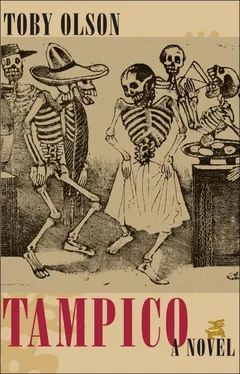“So this is why,” I said, “at the bar, the general didn’t interfere?”
“No,” she said, moving up behind me and pressing her hands against the small of my back. “This house means nothing to him. He has many. It was Ana, the weeping woman, and that Calaca, a business between them I had arranged. The general had no part in it. It was a matter of honor.”
And I suppose it was honor too that kept the rhythm of our relationship so consonant. I was white as a criollo, but no Spaniard, and she was no mestizo, but pure Indian. And though I was a product of the oppressor, I was a child to her and to myself, though becoming a man through her. Neither of us was part of the franchise, though we were both making our livelihood from it.
I had money to burn, and I bought Chepa jewelry and clothing in the square. I bought small pieces of furniture, pottery, pictures for the walls and ice for the beer and wine, strapping it all into the de Havilland’s forward cockpit before I commandeered the plane each evening. Some noons I would ferry Chepa back to Tampico for grocery shopping. Then we would fly out together as the sun was setting. Though the city was hot and malarial, wind blew down from the foothills in a steady stream to cool our house. “It’s coming from where my people are,” she said. Her well was a deep one, and the water was cold and sweet on the tongue.
In the night, after dinner and brandy and cigars, Chepa would light many candles and move the screen away from the foot of the bed. We’d undress in the shadows, then pull the coverlet away and lie down beside each other on the cool white sheets. The pink Estrella would sit in a chair across from us, grinning, her red tongue lolling over her lip, Don Lupe curled like a healthy pine bough on the floor below her. Only Rata would be moving, a small piece of yellow fruit visible occasionally in candle and starlight as she sniffed at the rugs and in the corners of the room, looking for something she could never seem to find. Then Chepa would turn to me, her hair and lips brushing my shoulder and the soft flesh on the inside of her thigh crossing my knee. I’d feel her breath on my cheek, the whisper of her words so close to my ear it was as though my head was a tabernacle and her voice was inside it, disembodied, and as intimate as my own thoughts might be, were I thinking. She’d be singing, those soft, guttural Indian songs, then telling any number of stories as if they were all part of the same one.
A society woman on the streets of the Zona Rosa in Mexico City. She’s come from New York and her husband, a businessman, has given her the day for shopping. She’s done that, eaten a light lunch, and now she’s bored. The clothing and the pieces of fine jewelry she’s bought as souvenirs for friends make but a small bundle and a light one and she has only a broad shoulder purse and a sturdy shopping bag for toting. So she sets off into the back streets of the Zona, down into those byways where only Mexicans live.
The streets are empty, it’s siesta, and deep in a shadowy alley between a bookstore and an artist’s studio, she glimpses a sliver of movement as she passes. She stops, pauses, then returns to the alley’s mouth, and there, growing increasingly visible as it limps forward from the shadows, is a dog.
It’s a very small dog, short-haired, with large oval ears and a pug snout. Its color is a dirty white, and over the foreleg it holds limply above the ground, its chest is a row of bird bones, and its eyes, its protruding eyes, like those of a just-born calf, are rheumy and running, and it’s those eyes that get her.
A Chihuahua, she thinks, poor thing, and she squats down gracefully, places her shopping bag to stand alone on the broken pavement beside her, then reaches her palm and her opening fingers out toward it. The dog limps from the final shadows and to her hand, extends his snout tentatively and sniffs her fingers. Then, his mooning eyes in her eyes, protruding from his small skull as if they might pop out should he stare much longer, his salmony tongue slides through his lips and touches the tip of one of them. Her fingers curl back quickly. She’s a little startled, but she’s undeterred, and she takes the silk scarf from her neck, makes a kind of hammock out of it, then reaches down and lifts the dog, light as a single tortilla, swaddles him and stuffs him gently down into her shoulder purse, among the jewelry, cosmetics and air freshener.
This is a good woman, you can see, and unapproachable, so when she does not tell her husband about the dog, smuggles him aboard the plane, it is no wonder she is successful, given her husband, her fine clothing and demeanor. The dog leaves the bag only when the two have reached the woman’s apartment in New York City, the guest room that her husband never enters.
But the dog will not eat. The woman tries everything, and still he fails. Soon he no longer limps, though he might stand shivering beside the guest bed. And his eyes are closing, victims of an oozing infection.
Veterinary medicine? She’s tried that, pills and potions gathered from friends surreptitiously. And every imaginable hard food and liquid sustenance too. He’s sipped only at a saucer of milk, and this briefly, but that gives her the idea, mother’s milk. She’s heard it somewhere, a thing about animals, and she sets out with efficiency to find it, and she does.
The dog drinks and drinks again, and for a few days he’s limping, his eyes seem to be opening. But then he takes a turn and is failing again, even more quickly than before. No longer can he stand now, and his rheumy eyes have closed completely. He begins to resemble a premature fetus, a small dirty bladder of some kind, curled into a shallowly panting bit of wet empty flesh at the foot of the guest bed.
The woman, in desperation, calls the family doctor, who recommends a veterinarian of stature. Then she calls him and makes a special appointment for the afternoon. She goes then to the dog and lifts him, in a thin rubber pillowcase this time, and settles him gently on a bed made of dishrags deep in a cloth satchel.
They arrive at the doctor’s office on time and are ushered right into the examination room, where the woman takes great care in lifting the dog out of the bag. She places the small rubber package on the shining surgical table, then steps away, and the doctor steps forward and peels back the swaddling.
The dog has become nothing to the woman, nothing surprising that is, so when the doctor jumps back, a little shaken at the sight, she is offended. It’s only a dog, she says, though a very sick one. Ah, well, the doctor says. But did you feed it mother’s milk? I did, the woman says, and they both look down at the dog, only now recognizing that its eyes are half open and completely glazed over and that it is not breathing.
My poor, poor dog! the woman cries, her hands fluttering near her face.
Poor, yes, the doctor says, that is true. But this is no dog, Chihuahua or otherwise. This is a Mexican slum rat, numerous in those cities. Did you find it there?
The story unfolds no further, since the point has been made. It’s the weakness, cowardice, and filth of the Mexican and his representative dog, which is really a rat, or often mistaken for one and vice versa. But this has been a modern version of the story and a reversal is coming, which is not really part of the story but is suggested by it.
In the version just told, the woman is like the woman in any such story, elegant and refined, but though she is these things, and kind, she is also useless. There are no details in her life here, but for her concern with shopping, and though she is possessed of certain efficiencies she had no place to put them, but in the service of the failed resuscitation of a rat. The woman’s husband is completely absent in this version, a piece of reality and social commentary, since that’s the way it is up north.
Читать дальше












